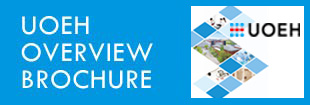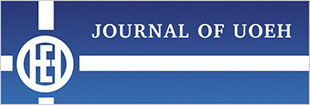At its founding in 1978, the University of Occupational and Environmental Health, Japan (UOEH) included “Japan” in its name with the forward-looking vision that occupational health would expand globally in the 21st century, and that similar institutions might be established in other countries around the world.
Since then, UOEH has actively promoted international engagement. In 1981, we held our first international symposium. In 1985, we began hosting International Group Training Course in occupational medicine commissioned by the Japan International Cooperation Agency (JICA). From 1988 onward, our Institute of Industrial Ecological Sciences (IIES) has been continuously designated as a Collaborating Center for Occupational Health by the World Health Organization (WHO).
In 2012, UOEH established the International Center. This initiative brought together international activities across various departments under a unified structure. The Center was first directed by Professor Emeritus Dr. Ken Takahashi, followed by Prof. Akinori Nakata, Prof. Toshiaki Higashi, Prof. Susumu Ueno.
Further progress was made in 2022 with the founding of the International Center under the inaugural leadership of Prof. Yoshiya Tanaka. This marked the beginning of a new era with the establishment of an annual international symposium and a dramatic increase in the number of Memorandum of Understanding (MOU) signed with universities and institutions across the globe.
In 2025, I assumed the role of Director of the International Center. My previous experience includes serving as an occupational health physician at the Keihin Works of Nippon Kokan (NKK), where I underwent residency training in occupational medicine at the University of California, San Francisco (UCSF), and participated in JICA projects at the ASEAN Institute of Health Development, Mahidol University (Thailand). As a professor in the Department of Health Policy and Management at UOEH, I have also contributed to international efforts as an expert for a bilateral WHO project with the Ministry of Health in Vietnam and as a board member of the International Commission on Occupational Health (ICOH). Drawing on these experiences, I am committed to further advancing the mission of the International Center.
Currently, the International Center is actively engaged in initiatives based on MOUs with 31 organizations, including the International Labour Organization (ILO). We host an international symposium each autumn, providing a forum for understanding global trends in occupational medicine and envisioning the future of the field. Our activities also include educational and training support for international students and short-term trainees, promoting student exchange in both the School of Medicine and the School of Health Sciences, coordinating weekly remote graduate lectures led by National Taiwan University starting each September, and encouraging faculty participation in international conferences such as the Japan-China-Korea Conference on Occupational Health and Safety.
With recent advances in ICT and AI technologies, geographical and language barriers have been greatly reduced, making international collaboration more accessible than ever. As Japanese companies continue to globalize, international perspectives and knowledge in the field of occupational health have become increasingly vital. We will continue striving to enhance UOEH’s international contributions and ensure that our presence is recognized worldwide in the fields of occupational and environmental health.
Seichi Horie
Director
I am honored to assume the role of Deputy Director of the International Center. I am deeply committed to this position and am eager to contribute to its success.
In today's globalized world, the importance of international exchange is paramount. As the pace of globalization accelerates, cultivating a deep understanding of diverse cultures and the ability to collaborate effectively across borders has become paramount for students. Moreover, from the perspective of both the Global South and the Global North, international exchange is not merely an academic connection-it is an opportunity to contribute to the sustainable development of our world.
At the International Center, we are engaged in various initiatives, including supporting international students, strengthening partnerships with overseas universities, hosting international symposiums, and promoting international collaborative research. As Deputy Director, I will strive to enhance these efforts and create an environment where more students and faculty members can gain valuable international experiences.
Intercultural exchange fosters innovation and enriches society. I am optimistic that this center will function as a conduit that connects people worldwide and strengthens our global connections. I am eager to collaborate with all of you to bring this vision to life.
Takeshi Ebara
Vice Director
I studied abroad in Thailand after graduating from our university. During my visits to Asian countries, I often meet researchers who have received training or conducted joint research at UOEH. At such times, I am very proud of UOEH as the alumni, and such connections often lead me to my next research. Developing countries in Asia are facing the same occupational health challenges that Japan has experienced, such as pneumoconiosis, chemical substance poisoning, and overwork. We would like to increase opportunities for the UOEH to contribute to such countries.
We will also support the careers of students who are interested in international exchange and study abroad, and will provide support to our international faculty and students to focus on their research and academic work. Students at our university tend to spend their days in a closed environment as a single-department medical university, but I hope that they will grow not only in knowledge and skills but also as human beings through exposure to diverse cultures and values in other countries.
Tomohiro Ishimaru
Vice Director



 Request
for
documents
Request
for
documents




